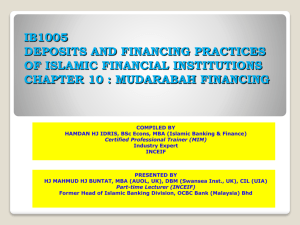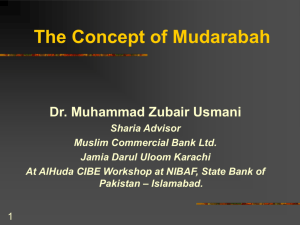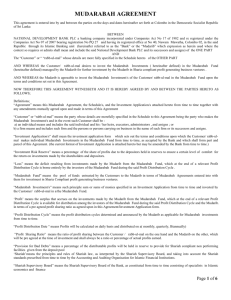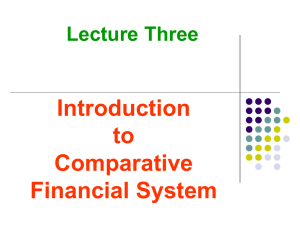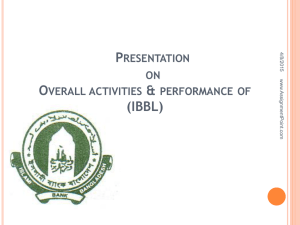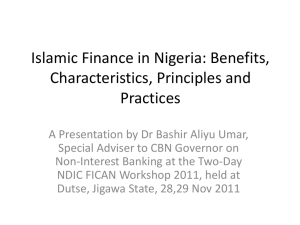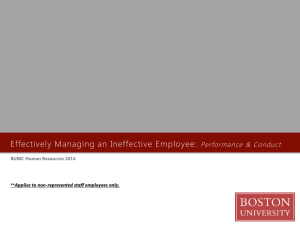The Concept of Mudarabah adopted by Dr. Muhammad Zubair Usmani
advertisement
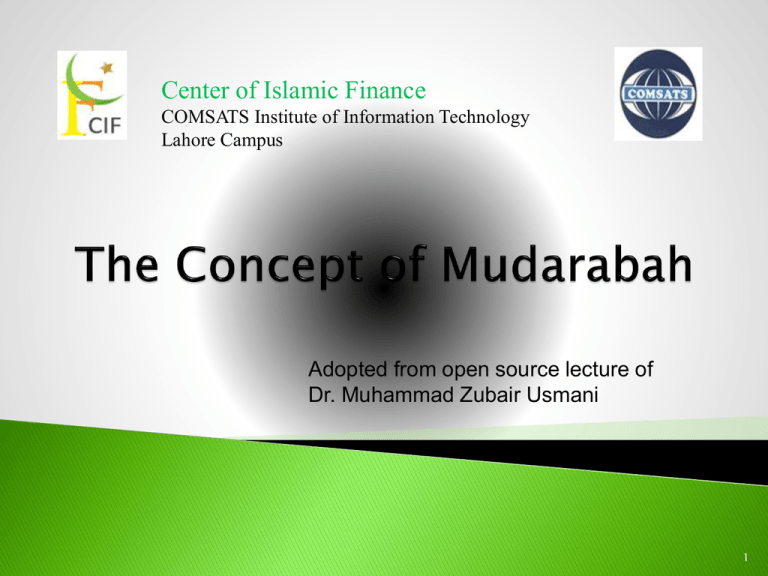
Center of Islamic Finance COMSATS Institute of Information Technology Lahore Campus Adopted from open source lecture of Dr. Muhammad Zubair Usmani 1 2 This is a kind of partnership where one partner gives money to another for investing in a commercial enterprise. The investment comes from the first partner who is called “Rab-ul-Maal” while the management and work is an exclusive responsibility of the other, who is called “Mudarib”. The profits generated predetermined ratio are shared in a 3 1. Al Mudarabah Al Muqayyadah (Restricted Mudarabah) 2. Al Mudarabah Al Mutlaqah (Unrestricted Mudarabah) 4 Rabb-ul-Maal may specify a particular business or a particular place for the mudarib, in which case he shall invest the money in that particular business or place. This is called Al Mudarabah Al Muqayyadah (restricted Mudarabah). 5 Rabb-ul-maal gives full freedom to Mudarib to undertake whatever business he deems fit, this is called Al Mudarabah Al Mutlaqah (unrestricted Mudarabah). 6 Rabb-ul-Maal has authority to: a) Oversee the Mudarib’s activities. b) Work with consents. Mudarib if the Mudarib 7 1. Ameen (Trustee): The money given by Rabbul-maal (investor) and the assets required therewith are held by him as a trust. 2. Wakeel (Agent) : In purchasing goods for trade, he is an agent of Rabb-ul-maal. 3. Shareek (Partner): In case the enterprise earns a profit, he is a partner of Rabb-ul-maal who shares the profit in agreed ratio. 8 4. Zamin (Liable): If the enterprise suffers a loss due to his negligence or misconduct, he is liabel to compensate the loss. 5. Ajeer (Employee): If the Mudarabah becomes Void due to any reason, the Mudarib is entitled to get a fee for his services. 9 The capital in Mudarabah may be either cash or in kind. If the capital is in kind, its valuation is necessary, without which Mudarabah becomes void. 10 It is necessary for the validity of Mudarabah that the parties agree, right at the beginning, on a definite proportion of the actual profit to which each one of them is entitled. They can share the profit at any ratio they agree upon. However in case the parties have entered into Mudarabah without mentioning the exact proportions of the profit, it will be presumed that they will share the profit in equal ratios. 11 Some incentives my be given to the Mudarib. Apart from the agreed proportion of the profit, the Mudarib cannot claim any periodical salary or a fee or remuneration for the work done by him for the Mudarabah. The Mudarib & Rabb-ul-Maal cannot allocate a lump sum amount of profit for any party nor can they determine the share of any party at a specific rate tied up with the capital. 12 If the business has incurred loss in some transactions and has gained profit in some others, the profit shall be used to offset the loss at the first instance, then the remainder, if any, shall be distributed between the parties according to the agreed ratio. 13 Mudarabah can be terminated any time by either of the two parties by giving notice. If Mudarabah was for a particular term, it will terminate at the end of the term. Termination of Mudarabah means that the Mudarib cannot purchase new goods for the Mudarabah. However, he may sell the existing goods that were purchased before termination. 14 If all assets of the Mudarabah are in cash form at the time of termination, and some profit has been earned on the principal amount, it shall be distributed between the parties according to the agreed ratio. If the assets of Mudarabah are not in cash form, they will be sold and liquidated so that the actual profit may be determined. 15 If there is a profit, it will be distributed between Mudarib and Rab-ul-Maal. If no profit is left, Mudarib will not get anything. 16 THANK YOU 17
